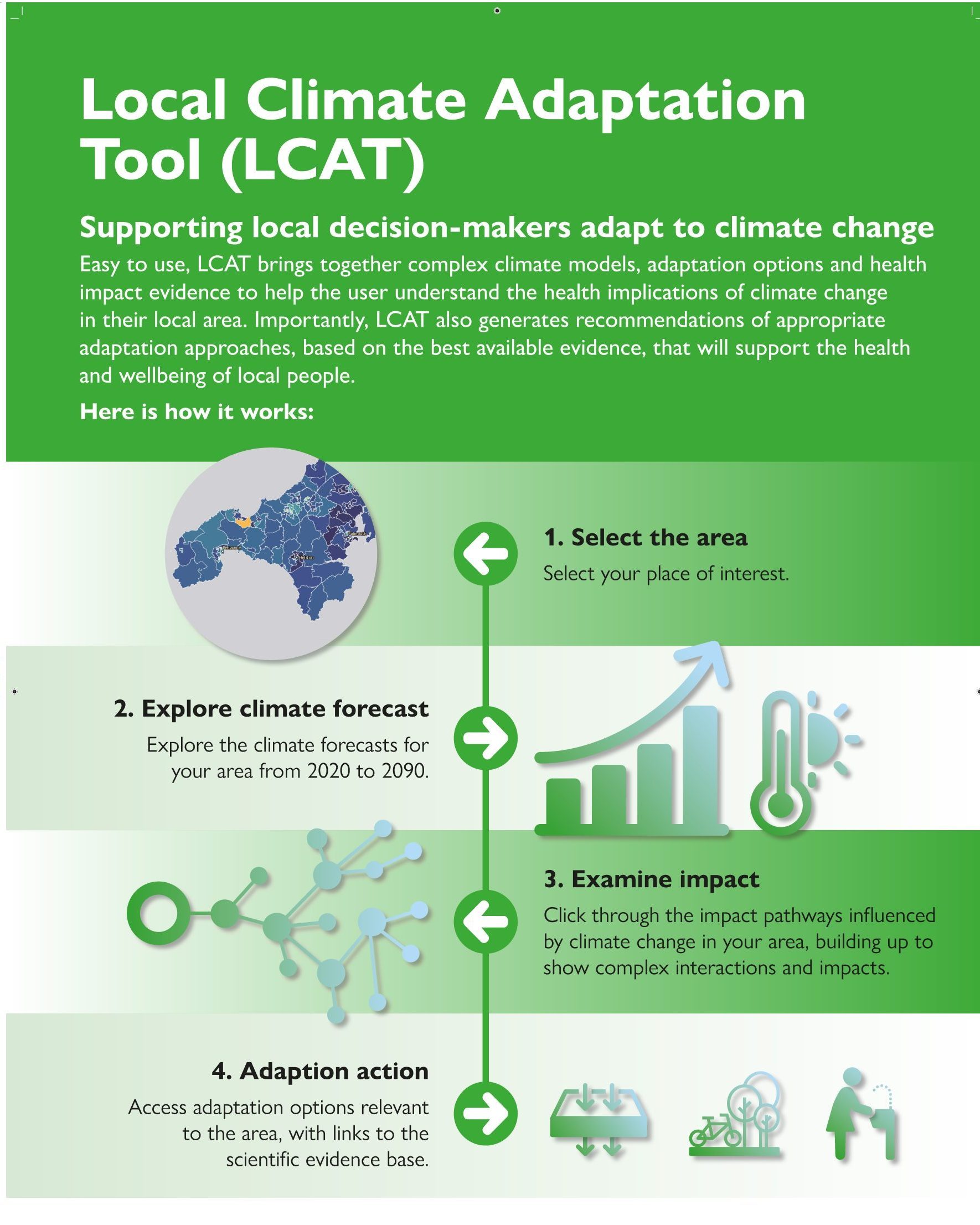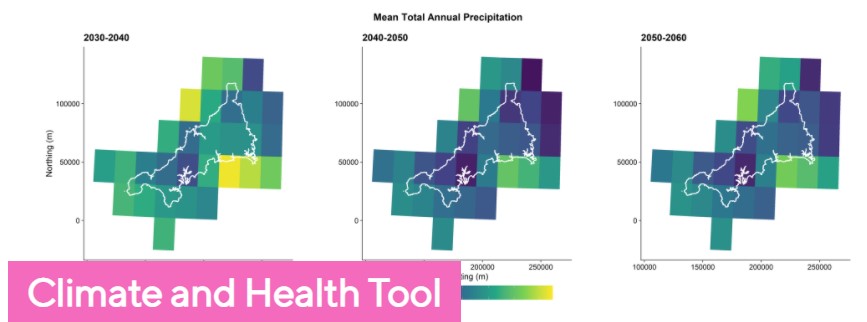LCAT is a tool which supports local decision makers across the UK to plan and adapt to climate change. It has been developed by a partnership between the European Centre for Environment and Human Health and Cornwall Council with input from The Alan Turing Institute alongside a wide range of local stakeholders from across the UK.
What is LCAT?
The Local Climate Adaptation Tool (LCAT) brings together complex climate models, adaptation options and community and health impact evidence to help the user understand the health implications of climate change in their local area. Importantly, LCAT also generates recommendations for appropriate adaptation approaches, based on the best available evidence, to support the health and wellbeing of local people. LCAT has been co-developed with, and for, local authorities and local service providers.
How does the tool work?
LCAT allows the user to:
- Select a local area of interest and see the predicted climate for this area over the coming decades followed by likely hazards.
- Explore likely community and health impacts via impact maps to show the complex relationship between climate change and local impacts.
- Explore vulnerability information and consider who is vulnerable, why and how to find data on those communities.
- Consider the adaptation options which can be filtered by key topic areas.
The aim is to support local areas to plan for adaptation and enable the best possible health and well-being outcomes for local people. For example, planning cycle paths with shade for hotter summer months and protection from stronger cross winds in the winter, ensures people can continue to gain the health and wellbeing benefits of cycling in a changing climate.
The tool is free and open source, and is aimed at helping councils, the NHS and emergency services as well as local service providers to understand what is likely to happen and prioritise their climate adaptation approaches.

Why was LCAT developed?
An initial year was spent exploring how key stakeholders were adapting to climate change, what the barriers were to action and finding a common language that would allow decision making across traditional boundaries.
The findings were clear, very little action on adaptation was taking place and stakeholders felt unequipped to take action.
Stakeholders identified the need for:
- Access to local future climate models;
- Clear guidance on appropriate adaptation, that was evidence based;
- Guided access to the evidence base;
- Support to work across traditional boundaries;
- The use of health outcomes to drive decision making provided a common currency.
These findings led to the creation of the Local Climate Adaptation Tool (LCAT) Project. A specification, co-designed with stakeholders, supported the creation of a first prototype, using Cornwall and the Isles of Scilly (CIoS) as the pilot site. The tool was showcased at COP26 in Glasgow, winning Highly Commended in the Climate Challenge Cup.
How did LCAT develop beyond the first prototype?
The second phase focused on broadening the scope to cover the whole of the UK. With that, we established an LCAT National Stakeholder Group to continue the co-design ethos. During this phase we worked with over 100 professionals, representing around 50 local areas across the UK running co-design workshops and ‘teach-in’ sessions with keynote speakers. Workshops happened 2-3 times a year, online and involved a mix of activities and test and learn sessions. We also held one-off ‘deep dives’ into particular topic areas such as vulnerability and inequality.
As it has developed further, updated iterations, with more data, content and evidence were published, using the UK’s Third Climate Change Risk Assessment (CCRA3) as the evidence starting point. The full tool launched in February 2024, but the iterative development process has, and will, continue with updates and improvements led by stakeholder feedback and as research and policy develops. In July 2024, it was awarded Sustainability of the Year Initiative at the Socitm awards.
What are the key barriers to local climate adaptation?
Throughout the project we have been monitoring the key barriers to local climate adaptation. This is a key element of the co-design process because it is important that the tool works with, rather than against, the policy and practice context that users work. Furthermore, the tool had the potential to overcome, rather than add to any known barriers. Barriers include:
- Lack of financial and time resources
- Culture of short-term decision making
- Desire for cross-service & partnership working
- Lack of knowledge, skills and confidence in this space
- Concerns focussed on deepening inequality, mental health, justice
- Lack of guidance/ tools to support work in this area particularly on HOW to adapt
In response, LCAT has been designed to:
- Be free and easy to use, saving time and money
- Curate a huge amount of data and literature into one place saving users time and the need for specialist expertise
- Promote multi-sectoral working by illustrating the whole-system approach to adaptation, challenging areas to work out of traditional siloes
- Provide learning opportunities to build skills and knowledge by providing explanatory content and an accompanying learning resource, the ‘Introduction to Local Climate Adaptation’.
- Provide an evidence-based list of adaptation options offering local areas the guidance they need on planning for adaptation in their areas
Why does LCAT focus on different sectors?
The health and wellbeing impacts of climate change are complex and wide ranging. They cross-cut multiple sectors from healthcare, to housing, to infrastructure and more.
The tool helps professionals take a multi-agency approach to build resilient and healthy communities.
Those with least resilience to the effects of climate change are often vulnerable due to multiple factors including personal, social and environmental factors. For example, quality of housing, access to greenspace and poverty. It is therefore important that professionals across sectors and departments work together to understand and reduce those inequalities.
Why is health the major focus?
The use of a health lens provides a common ‘language’, relevant to all service areas, and facilitates a multi-agency approach to adaptation planning. Key to supporting informed decision making is a link to the evidence base. The tool identifies key, published evidence on health and wellbeing outcomes to support the recommendations and advice it will generate.

How is LCAT supporting health and economic equity?
Climate change impacts are not felt equally as many people are more vulnerable due to personal, social and environmental factors. Furthermore, climate change is likely to increase current inequalities. Stakeholders involved in the co-design of LCAT have consistently voiced their concerns about deepening inequality and, as such, LCAT has been developed to provide information, and datasets, on vulnerable groups.
Using insight and data from Climate Just, LCAT supports decision makers to identify who is vulnerable and therefore take a more equitable approach to planning adaptations. As a new addition in 2025, the tool also includes Deprivation Data for local areas.
Key learning and insight from the project
- Applying co-design principles to tool or resource design are key to developing tools that truly meet user need and are effective.
- Asking end users about their policy and practice context, and the barriers they face, ensure that any tool or resource fits with, rather than clashes with, the ways they work and the issues they face. At best it can help overcome some barriers.
- It is important to understand users’ knowledge and skills both in terms of how they understand the basic science through to how they interpret data or graphs. It is not ok to assume a particular level of skill or knowledge and tools can be designed in way that makes complex information really simple and understandable.
- Tools can only do so much, and learning needs may also need to be supported by providing additional guides, case studies or learning opportunities.
- Offering data and information in layers – starting from simple top-line summary down through more layers of complexity – is a great design feature which allows multiple users, with differing needs, to get what they want without getting bogged down in the detail.
- Visualising data through images and infographics helps simplify things. It can help make complex information understandable and accessible. Users told us they did not want much heavy text.
- Taking a systems-approach to climate & health helps promote multi-agency working and a whole-area approach, consistent with best practice advice. This also helps decision-makers understand the complexity of the issue through providing impact maps as a visual and helping them understand the wider determinants of health.
For more information on the tool and methodologies used, please refer to our user guide.
Or get in touch on LCAT@exeter.ac.uk
